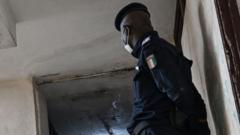Following the assassination of two students, the Ivory Coast government has ordered a shutdown of all student unions and launched investigations into the Student and School Federation (Fesci), which is facing accusations related to torture, extortion, and other violent acts.
Government Closes Student Unions in Ivory Coast Amidst Allegations of Violence

Government Closes Student Unions in Ivory Coast Amidst Allegations of Violence
The closure follows serious allegations against the Student and School Federation (Fesci), including murder and torture linked to two student fatalities.
The Ivory Coast government has announced the suspension of all student unions, including the influential Student and School Federation (Fesci), in response to troubling allegations of murder, rape, and torture. These severe claims follow the tragic deaths of two students, Khalifa Diomandé and Zigui Mars Aubin Déagoué, whose murders have been linked to Fesci activities.
Authorities report that recent investigations at Félix-Houphouët-Boigny University in Abidjan uncovered an underground tunnel purportedly used for torture, as well as a brothel. According to several students, the existence of these illicit operations was an apparent secret on campus, yet fear of retaliation kept many from speaking out.
One former student, choosing to remain anonymous, recounted her harrowing experiences, stating, “I was threatened by Fesci many times, they tried to rape me.” She also revealed that her boyfriend was assaulted for attempting to defend her. Reflecting on her traumatic past, she remarked, “I don’t know how it lasted so long but now I feel relieved for the victims.”
Student accounts detail a culture of extortion where Fesci demanded more than what was fairly owed. “I was supposed to pay $100 (£77) per month for my room, but they were forcing me to pay $250,” complained another student, Jose Aristide. In response to these alarming conditions, the government’s Security Council conducted several raids in which over 100 weapons were confiscated, leading to the expulsion of thousands of unauthorized residents from the university campuses.
The announcement of the student union closure was met with visible celebration among the community, with some educators expressing hope that such a ban would restore peace on campuses. Fesci, initially founded in the 1990s as a student organization, gradually shifted into an anti-government faction and has long been implicated in criminal activities, raising questions about its historical influence on Ivorian politics, with past leaders such as Guillaume Soro and Charles Blé Goudé attaining notable political positions.
As this story unfolds, many are left to ponder the implications of these events on student safety and the broader political landscape in Ivory Coast.




















